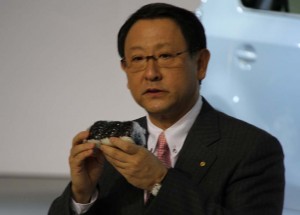Toyota is aiming to be the first automaker ever to hit the 10 million sales mark by 2015 – which would be a 20% jump from 2010 – by focusing on China and other emerging markets.
That aggressive goal was outlined by President Akio Toyoda as he laid out the maker’s “Global Vision,” an expansive plan that will also result in a sharp cutback in senior management ranks, a move apparently aimed to give the executive – the grandson of Toyota’s founder – a firmer grip on the company.
The 54-year-old executive, who took control of Toyota in 2009, also said his goal is to push profits to 1 trillion yen — $12 billion at current exchange rates – “as soon as possible.”
To get there, Toyota plans to generate 15% of its sales from China. The maker was relatively late to enter what is now the world’s largest national car market, however, and is playing a game of catch-up with leaders Volkswagen and General Motors. It also has to overcome lingering Chinese resentment of Japan. Toyota also hopes to boost sales in other booming markets like India and Brazil.
“We will focus on emerging markets and environmental vehicles,” said Toyoda, a reference to the maker’s steadily expanding line-up of battery-powered vehicles.
In January, the family heir made his first appearance at the Detroit Auto Show to unveil an assortment of new hybrids and plug-in vehicles, all of which will borrow the familiar Prius name – which will now become a brand-within-a-brand.
Getting to 10 million would require a big jump from the 8.42 million vehicles Toyota sold in 2010, but last year’s numbers also fell short of the maker’s original target. That was, in part, the result of temporarily halting production of a number of key models, early in the year, to address problems with sticky accelerators.
Toyoda cautioned that the 10 million figure is not an absolute goal, a relief to those who feel the Japanese giant got into trouble by putting too much emphasis on growth in the first place. Toyota recalled more than 11 million cars in 2010 alone for a variety of problems ranging from faulty brakes to excess corrosion – as well as those sticky accelerators.
The chief executive stressed that his goal is to make quality as important as it had been for Toyota, which used to set the industry benchmark.
“I want Toyota to make good cars that will make everyone smile,” Toyoda told reporters during a briefing in Tokyo.
Significantly, Toyoda’s “Global Vision” will result in the elimination of 16 members from Toyota’s current 27-seat board of directors. There will be additional cuts in top management, as well.
That should “increase the speed of decision making,” suggested Kurt Sanger, auto analyst with Deutsche Bank.
Notably among those leaving the company is Vice Chairman and board member Katsuaki Watanabe, who Toyoda succeeded as president two years ago.
Company sources have suggested the board cuts also reflects the Toyota heir’s desire to firm up his control and to get rid of managers who some have blamed for the ongoing safety crisis. Senior management has repeatedly been faulted for trying to stonewall some recent recalls – which resulted in Toyota being hit with record fines collectively totaling $48.4 million by U.S. safety regulators last year.
Overcoming the blow to its reputation won’t be easy, observers warn. The maker did get a helping hand when, last month, Department of Transportation Secretary Ray LaHood announced the result of a year-long investigation that found no defects in Toyota’s electronic engine controllers. But less than two weeks later, Toyota announced a new recall related to unintended acceleration, this one involving 2.2 million vehicles.
A presentation of the Toyota Global Vision was subheaded “Rewarded by a smile by exceeding your expectations.” But the outline seemed to fall short of analysts’ expectations, some describing it as “wishful thinking, and “wishy-washy.”
”I thought Toyota would come out with a vision that leads its competitors, but I didn’t see anything like that,” Tatsuya Mizuno, a director at Mizuno Credit Advisory in Tokyo, told the Bloomberg news service.
Meanwhile, analyst Sanger suggested Toyoda’s forecast might actually err on the cautious side. If anything, he noted, Deutsche Bank is predicting profits closer to 1.2 trillion yen by 2013.
Toyoda’s presentation was delivered in a mix of Japanese and English, which he described as the world’s international language. It also suggested that while new markets like China and India might be seen as a place to boost the Toyota balance sheet, the maker isn’t about to walk away from North America – a market that has traditionally delivered 60% of its operating profit.
While Toyoda has grand plans for his company, he will be facing some stiff competition. A newly resurgent General Motors came within 30,000 units of toppling Toyota as world’s biggest car company last year — a title GM ceded two years earlier. Meanwhile, Volkswagen has laid out growth plans of its own that call for it to become the world’s largest automaker before the end of the decade.


